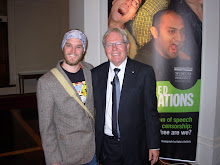After emerging from the wasteland of essay hell, I journeyed to the incomparable Electric Shadows Bookshop (www.electricshadowsbookshop.com.au) intent on renting some DVDs for a reason other than writing an essay about them. Finding myself in the Hitchcock section, I thought I would grab something not on the 1001 list so I would not feel obliged to write about it. However, with Hitch having 18 titles on the list, its not always easy to avoid one thats on there. Attracted by the presence of Joseph Cotten in the leading role I thought Shadow of a Doubt (1943) was my film. But, lo and behold its on the list, so here are my thoughts.
Cotten is best known as running with Orson Welles' RKO crew, and is fantastic in quite a substantial role in Citizen Kane (1941). Here he plays Uncle Charlie, a suave Philadelphia based mass-murderer who flees to suburban Santa Rosa to escape the law. He is welcomed heartily by his sister's family, especially her teenage daughter who also goes by the name Charlie. The two Charlies share a rapport and the relationship between the two of them drives most of the film. Young Charlie hopes her elder namesake will bring some light into the mundane family life she feels so trapped in, and which she is clearly rebelling against. Early in the film she squeals “Money, how can you talk about money when I'm talking about souls.” However her uncle brings more than a spark. I'm not sure if this was intentional by Hitchcock, me misreading the film or times changing but I was seriously creeped out by an apparent sexual tension between uncle and niece for the first half of the film. Luckily this passes and the film feels much more comfortable as a result. Eventually Young Charlie begins to suspect him of being a murderer, and even manages to wrangle a confession out of him. This comes with still quite a large amount of the action to come, and the third act deals with the moral conundrum faced by Young Charlie in relation to protecting her family and ensuring justice is served. Keep an eye out for the scene involving Young Charlie's research in the town library, it illustrates Hitchcock genius for suspense and ability to wow you with a little stylistic flourish without taking away from the narrative.
Film historian (and director) Peter Bogdanovich views this as Hitchcock's first real 'American' film. However the European influences on his style can still be seen throughout this film. To showcase an early chase on foot, he shifts to a high overhead shot, just as Fritz Lang does repeatedly in M (1931). The film seems to grow more and more assured as it goes on. For example the music initially grates and feels like an over the top, cheap attempt to ratchet up suspense. Later however it is more controlled and does contribute to the tension in an excellent way. All of the performances are good. Cotton excels in a role that could have descended into a pure-evil, sneering type character. He's understated, but still makes you dislike him terribly and believe he is capable of murder. Plus he looks rather good in a double breasted suit with a couple of cigars poking out the breast pocket. All the other performances are similarly good, notable the supporting duo of Henry Travers as Joe, Young Charlie's father and his best mate Herb played by Hume Cronyn. These two share a couple of exceptionally well-scripted and hilarious set pieces where they discuss suspense stories, and the best manner in which to kill someone without being detected. The manner in which Hitchcock intersperses these with the rather more serious and deadly going ons provides an expert twist of humour and irony.
The major upside of this film is its central conceit – two character who share a name and a rapport despite being different genders & ages end up being part of a suspenseful cat and mouse game. It is this that carries the film through its first two thirds, but it is in the third act where Shadow of a Doubt really explodes; delivering probably the most satisfying conclusion to a film I've watched. Hitchcock throws a twist or two into the mix, but they do not feel cheap or showy. He maintains, and even ramps up the suspense, leaving the viewer in real doubt as to how things will end. It is also perfectly paced, there is no rushed deus ex machina, nor does it go on and on a-la Return of the King (2003) and many others, tarnishing the memories of the whole film by leaving us begging for the end. I'm loathe to go into too much more detail in case it ruins this film for you. And despite the fact that it looks like I have given a way a lot of spoilers such as the fact Cotten plays a murderer (this was actually given away on the DVD case of my version), there are still heaps of surprises for you in this film if you go and check it out. Which you most definitely should. And if you don't trust my opinion, then you should trust Hitchcock (one of the greatest cinematic geniuses ever to live), who said this was his favourite of all the films he made.
Verdict: Longneck of Melbourne Bitter
Progress: 12/1001
Subscribe to:
Post Comments (Atom)

No comments:
Post a Comment